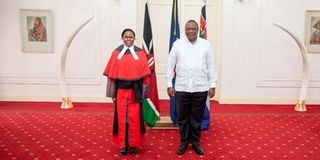Premium
Katiba Institute, lawyer sue to stop Chief Justice, Uhuru from swearing gazetted judges

President Uhuru Kenytta with Chief Justice Martha Karambu Koome at State House, Nairobi, on May 25, 2021.
A Nairobi-based lawyer and a lobby group have sued to stop Chief Justice Martha Koome and President Uhuru Kenyatta from swearing in a partial list of 40 judges recommended for appointment by the Judicial Service Commission.
Mr Adrian Kamotho Njenga and the Katiba Institute, in two applications filed under a certificate of urgency, want the court to compel the President to appoint the six nominees that he omitted in a Kenya Gazette notice released on Thursday evening.
Mr Njenga argues that by selectively appointing nominees recommended by the JSC the President has breached a February 6, 2020 judgment that required him to appoint all of them.
He wants the court to rule that Mr Kenyatta is in contempt of court and should be penalised for his actions.
Lawful sanctions
“The court be pleased to impose lawful sanctions including, but not limited to an order of committal to jail, of the person currently holding the office of the President for blatant breach of judgment and persistent violation of the Constitution,” reads the application.
Mr Njenga said that in the 2020 judgment a three-judge bench clarified the legal procedure for appointing judges and stated that the “President has no mandate to review, reconsider or decline to appoint persons recommended by the JSC”.
“The six persons whose appointments as superior court judges have been put on ice are victims of unpopular but lawful decisions that they have rendered in their professional and official capacity,” Mr Njenga argues.
“The President has no lawful powers to decide who assumes the position of a judge of the superior court or who doesn’t.”
In its case, the Katiba Institute says that selective appointments are both “unconstitutional” and “highly stigmatising” because they amount to a “constructive removal of any nominee who is already a sitting judge”.
The group had in June 2020 petitioned a court to block the President from making partial appointments. The move was prompted by information that the President was planning to cherry-pick nominees.
The determination of the petition is still pending and a hearing is scheduled to resume next month.
“The worst has happened: Katiba’s fears have come true. By Gazette Notice 5233 to 5235 of 2021, the President has cherry-picked some 34 judges in waiting while discriminating against six others,” the group says in court papers.
“The imminent swearing-in in these circumstances would irreparably violate the Constitution and the rights of the six judges in waiting (some of whom are already serving as judges). The matter is extremely urgent.”
Through lawyer Dudley Ochiel, the group wants the court to block the President and the Chief Justice, as well as their agents, from swearing in the 34 appointees until the new case is heard and determined.
The group is also seeking to have the CJ and the JSC barred from assigning duties to the 34 judges.
“Article 166 (1) commands the President to appoint judges of superior courts ‘in accordance with the recommendation of the Judicial Service Commission’.”
“The President has, however, refused to comply with this court’s order directing him to appoint judges in accordance with the recommendation of the JSC in 2019,” Mr Ochiel says.
“Instead, the President has cherry-picked some 34 of 40 judges in-waiting while discriminating against six others.”
He argues that the selective appointments or swearing-in of the 34 judges undermine the functions and powers of the JSC and the functioning of the Judiciary, and that it is an improper extension of the role of the Executive.





